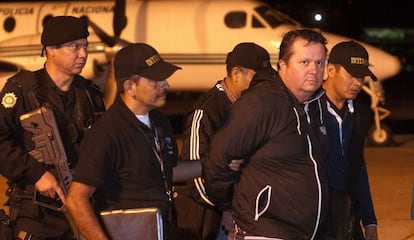Death penalty concerns nearly halt extradition of singer’s murder suspect
Costa Rica and Colombia want pledges Cabral’s alleged killer won’t be executed

An alleged Costa Rican money- launderer, suspected of being the mastermind behind last summer’s shooting ambush that took the life of internationally famous Argentinean folksinger Facundo Cabral, was extradited to Guatemala Tuesday night to face murder charges after authorities in Guatemala City made an international pledge not to impose the death penalty.
Alejandro Jiménez, alias “El Palidejo,” was captured trying to sneak into Colombia over the weekend. He was boarded on a plane under heavy security to Guatemala Tuesday before the flight was canceled 45 minutes from take-off.
Colombia and Costa Rica wanted assurances in writing that the suspect wouldn’t face capital punishment if he was convicted for Cabral’s murder. Guatemala is one of the few countries in the Americas where the death penalty remains applicable for certain crimes. Capital punishment is also still carried out in Cuba and other Caribbean islands as well as some US states.
Cabral, who was one of Latin America’s most celebrated leftist troubadours, was gunned down July 9, 2011 as he was being driven to an airport in Guatemala following a tour there. Law enforcement authorities believed that the attack had been aimed at Cabral’s friend, the nightclub owner Henry Fariñas Franco, who was driving the singer-songwriter and was wounded in the ambush.
The murder of 74-year-old Facundo, who became famous 40 years ago with his most famous hit No soy de aquí, no soy de allá (or, I am not from here, I am not from there), shocked the whole of Latin America.
Authorities say that since the killing, Jiménez had been hiding out between Costa Rica, Panama and Nicaragua. He tried to enter Colombia with false papers by boat, which was intercepted on Saturday.
“We noticed his peculiar accent,” Colombian National Police director Óscar Naranjo told reporters, who added that Jiménez was seeking the protection of Los Rastrojos, an up-and-coming drug cartel in Colombia which purportedly offered him protection and safe passage to a southern South American nation.
Last August, the attorney general’s office in Costa Rica charged Jiménez with being the head of a vast money-laundering network in which his wife and parents, who have since the left the country headed reportedly for Japan, were also said to be involved.
The 37-year-old Jiménez is believed to have ordered the hit on Fariñas Franco after the two disputed the ownership of a nightclub. On Monday, Costa Rica sought his extradition but later decided to allow Guatemala to take him.
But at the last minute, Costa Rican Foreign Minister Carlos Roverssi said that the government of Laura Chinchilla wanted guarantees that Jiménez would not face the death penalty.
Roverssi explained to the San Jose daily Diario Extra that there is a standing order from the Inter American Court for Human Rights that Guatemala cannot apply the death penalty in any case because it is a signatory of the San Jose Pact for human rights.
While officials from three countries aired concerns, the suspect waited at an anti-drug airbase in Bogota. Arturo Aguilar, secretary to Guatemala’s attorney general, said that his country has temporarily suspended the death penalty following a recent ruling from the nation’s Supreme Court, which commuted all such sentences to 50-year prison terms. “At this moment, the death penalty is not being applied,” he said.
Tu suscripción se está usando en otro dispositivo
¿Quieres añadir otro usuario a tu suscripción?
Si continúas leyendo en este dispositivo, no se podrá leer en el otro.
FlechaTu suscripción se está usando en otro dispositivo y solo puedes acceder a EL PAÍS desde un dispositivo a la vez.
Si quieres compartir tu cuenta, cambia tu suscripción a la modalidad Premium, así podrás añadir otro usuario. Cada uno accederá con su propia cuenta de email, lo que os permitirá personalizar vuestra experiencia en EL PAÍS.
¿Tienes una suscripción de empresa? Accede aquí para contratar más cuentas.
En el caso de no saber quién está usando tu cuenta, te recomendamos cambiar tu contraseña aquí.
Si decides continuar compartiendo tu cuenta, este mensaje se mostrará en tu dispositivo y en el de la otra persona que está usando tu cuenta de forma indefinida, afectando a tu experiencia de lectura. Puedes consultar aquí los términos y condiciones de la suscripción digital.








































